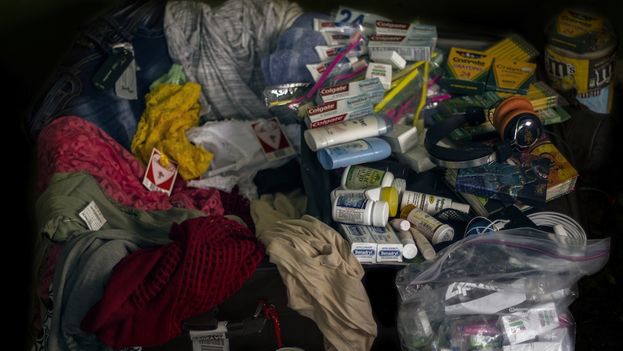
14ymedio, Victor Ariel Gonzalez, Havana, 6 December 2014 — Establishing the rules of a sport takes time. Let’s take for example baseball, one of the most complicated games that exists; one could ask where the rules for its practice come from, and why some are so convoluted. But when it comes to regulatory whim, let’s go to an activity that increasingly approaches the category of extreme sport, and that is the entry of products into Cuba trying to pass through the controls of the Republic’s General Customs (AGR).
Much curiosity is awakened by the heap of prohibitions, conditions and loopholes that regulate the arrival of luggage and packages to the Island. There are so many questions that the official press devotes a lot of space to explaining how the still-confusing system functions. But more than confusing, annoying, because it affects the way in which Cubans cope with their shortages, while also feeding a bulky staff of officials.
This Thursday the official daily Juventud Rebelde devoted a whole page to detailing, for the umpteenth time, how the mechanism works. With the title of The Other Package – a clear allusion to the demonized “weekly package*” – the text delves into the issues that it considers most important for public awareness in regards to international parcels.
For that it cites, for example, Law Decree 22, where it is provided that the total value of shipments may not exceed 200 CUP (Cuban pesos — roughly $8 US); and Resolution 208 from 2014 whose provisions establish that the import value of one kilo of miscellaneous items equals 20 pesos, so up to 10 kilograms of miscellaneous items can be imported via shipping, with the first 30 CUP (1.5 kilos) being duty free.
Until that point let’s say everything is clear. The complications come when the shipment is made of up “miscellaneous items” and “durable” goods like appliances or tires. In such case, “the sum of both values must not exceed the import limit legally established (…) because all that exceeds that figure will be confiscated after the person chooses the articles that he wants to prioritize.”
This is only the first complication of a thick tangle, because there are also sender-receiver considerations. A Cuban resident on the Island who finds himself on a trip, for example, will not be able to send to himself a package on return to his country. The condition would be that the delivery be classified as “household goods,” and not everyone in the world has this right. Who does? The bulky manual of the AGR offers an imaginative response.
Also, the number of entries into the country determines the quantity of products that can be brought in luggage, and this will affect also the ability to receive packages. In sum, a newspaper page is not enough to explain all that one needs to know when not knowing it could mean that they won’t let your soap or coffee pass through.
In a country where the government lives to complain about external harassment, the citizens live under the harassment of the authorities. Any effort to supply the informal market or even the family economy in an independent way can be considered illegal, without it mattering that said activity serves to remedy the shortages somewhat.
In the capital there are three delivery points for packages. The others are in Holguin, Camaguey, Santiago de Cuba and Varadero. Since there is no courier service, those who live distant from these warehouses are obliged to make inter-provincial trips. More complications, more work, more bother.
The directives of the AGR recognize that the existing installations are insufficient, and they resort to the now usual promise that “we will continue to expand service.”
If there is an excess of luggage or the package is too big – very easy to achieve given the strict margin established – then comes the expropriation, a point that has been avoided by official investigations.
When 14ymedio contacted the AGR asking about the matter, it reported the confiscated articles wind up at the Ministry of Interior Commerce (MINCIN), “so that they can be distributed to the Ministry of Health and Education and others.”
Nevertheless it is extremely difficult, if not impossible, to find in a hospital or school a flat screen television, a bottle of L’Oral cream or other products that are commonly confiscated on arrival into the country.
For its part, at the MINCIN, specifically the “office of attention to the people,” the operator does not know where to direct the question. “This is the first time that someone has called asking what happens to what Customs confiscates.”
One suspects that corruption within the AGR is rampant. After all, the popular wisdom says that in Cuba everyone has a need, so everyone has a price.
It is evident that travelers insist on tricking customs controls, and it is highly likely that they will keep trying. The contraband, another non-institutionalized sport, challenges the imagination, even that of those charged with writing the customs laws.
*Translator’s note: The so-called “weekly package” is a collection of videos and other materials, ranging from news articles to computer games, that circulates hand-to-hand in the ‘grey market’ as an alternative to the very limited official TV and radio programming and other Party-owned media.
Translated by MLK
